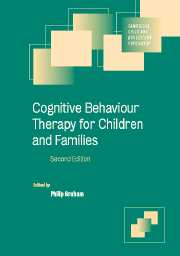Book contents
- Frontmatter
- Contents
- List of contributors
- 1 Introduction
- Part I Developmental cognitive theory and clinical practice
- 2 Cognitive behaviour therapy for children and adolescents: some theoretical and developmental issues
- 3 Cognitive behavioural therapy in developmental perspective
- 4 Psychological therapies: a family of interventions
- Part II Engagement and assessment
- Part III Client groups
- Part IV Applications in psychosocial adversity
- Part V Applications in specific child and adolescent psychiatric disorders
- Part VI CBT applications in preventive interventions
- Index
- References
2 - Cognitive behaviour therapy for children and adolescents: some theoretical and developmental issues
Published online by Cambridge University Press: 21 August 2009
- Frontmatter
- Contents
- List of contributors
- 1 Introduction
- Part I Developmental cognitive theory and clinical practice
- 2 Cognitive behaviour therapy for children and adolescents: some theoretical and developmental issues
- 3 Cognitive behavioural therapy in developmental perspective
- 4 Psychological therapies: a family of interventions
- Part II Engagement and assessment
- Part III Client groups
- Part IV Applications in psychosocial adversity
- Part V Applications in specific child and adolescent psychiatric disorders
- Part VI CBT applications in preventive interventions
- Index
- References
Summary
Introduction
The term cognitive behaviour therapy (CBT) is used to cover a wide range of interventions in child and adolescent mental health, including (in no particular order) psychoeducation, anger management, anxiety management, behavioural operant methods, behavioural exposure methods, self-instruction methods, graded exercise, relaxation, social skills training, some kinds of parent training and cognitive restructuring in the style of adult CBT. There is a genuine question whether and in what sense this range and variety can be usefully seen as expressions of a unified model. In any case, it is common for authors on the theory and practice of CBT for children and adolescents to point out that the treatment model should take into account developmental issues, although it is less common for there to be detailed elaboration on what the developmental issues are that are crucial in relation to CBT for children and adolescents.
It turns out, this author believes, that there is a range of complicated theoretical issues, as well as a lack of data, underlying the question of developmental context of CBT. These issues include questions such as: given that behavioural methods can be used with children and can work well in some kinds of case, what is involved in adding ‘cognitive’ therapy? What is the real difference – in methods, or in the underlying models – between behaviour therapy for children and cognitive therapy? Is there a reasonable sense in which behaviour therapy modifies cognition and, therefore, is (a kind of) cognitive therapy?
- Type
- Chapter
- Information
- Publisher: Cambridge University PressPrint publication year: 2004
References
- 4
- Cited by

